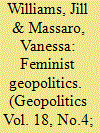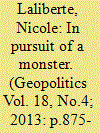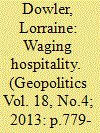|
|
|
Sort Order |
|
|
|
Items / Page
|
|
|
|
|
|
|
| Srl | Item |
| 1 |
ID:
126993


|
|
|
|
|
| Publication |
2013.
|
| Summary/Abstract |
For the Geopolitics Lecture at the Association of American Geographers Annual Meeting 2010, the paper examines the core features of Mackinder's geopolitical imaginary, reviews contemporary challenges to those elements and develops an alternative conception of space for a Progressive Geopolitics.
|
|
|
|
|
|
|
|
|
|
|
|
|
|
|
|
| 2 |
ID:
126988


|
|
|
|
|
| Publication |
2013.
|
| Summary/Abstract |
Geopolitics today is increasingly marked by the violent convergence of (in)security, market integration, and dispossession. Yet few studies address the connected, counter-insurgent geopolitics of ostensibly ameliorative, women-focused development interventions in the (post)colonial world. This paper charts a new theorisation of the geopolitics of development by focusing on gendered social movements, intersecting relations of difference, and social reproduction in two seemingly distinct areas: rural Guatemala and urban India. It introduces a transnational feminist geopolitical analytic - based on relational comparison, critical ethnography, and collaborative dialogue - to elucidate both specificity and global interconnection. Specifically, this consists of analysing struggles over dispossession through processes of 'de(bt)velopment' in the Ch'orti' Highlands and 'redevelopment' in Mumbai at key historical conjunctures. These struggles illuminate not only (in)securities experienced by marginalised groups but also the transformative potentialities and domesticating limitations of social mobilisation. In conclusion, the paper offers insights into the how of doing more liberatory geopolitical praxis.
|
|
|
|
|
|
|
|
|
|
|
|
|
|
|
|
| 3 |
ID:
126994


|
|
|
|
|
| Publication |
2013.
|
| Summary/Abstract |
Mainstream post-positivist approaches to Border Studies typically represent national borders as losing their importance or blurring. This insight usually fails to grasp the perspective of those who have to cross 'hard' borders, for whom these borders are primarily 'hard facts' quite precisely restricting territorial limits of their movement. Aiming to take this perspective and practical problems experienced by such border crossers into account, the author proposes an approach focusing on communication between those who cross 'hard' borders and those who protect these borders. The case of the EU-Russian border shows that border crossers have an increasing range of options to make themselves heard by their own country's officials, though it is much more difficult for them to reach gatekeepers and public on the other side of the border without resorting to intermediaries (such as their states or business actors). The author suggests that border crossers could be heard better if cross-border cooperation initiatives would prioritise this purpose thus making the EU's external borders not only 'friendly' or 'blurred' but also 'dialogic'.
|
|
|
|
|
|
|
|
|
|
|
|
|
|
|
|
| 4 |
ID:
126992


|
|
|
|
|
| Publication |
2013.
|
| Summary/Abstract |
This paper argues for the importance of attending to both affective and emotional experience in analysing the origins and effects of border and immigration efforts in the US/Mexico border region. We do so by engaging with theoretical understands of the politics of affect and emotion among cultural and feminist geographers and social scientists. We then examine Arizona's SB 1070 and its connection to a larger history of border and immigration enforcement in Arizona. Drawing from ethnographic work, interviews, and media and policy analysis, we engage with narratives provided by border area ranchers to unpack how these ranchers' encounters with unauthorised migrants have changed over time. We then examine how the everyday fear and anxiety associated with these encounters drive political activism and state intervention in the region. We conclude by discussing how this intervention, in turn, reproduces racial and gender hierarchies, hierarchies that are themselves affectively mediated.
|
|
|
|
|
|
|
|
|
|
|
|
|
|
|
|
| 5 |
ID:
126985


|
|
|
|
|
| Publication |
2013.
|
| Summary/Abstract |
This piece is the introduction to a special section on Feminist Geopolitics focusing specifically on securitisation. This introduction provides an overview of the field of feminist geopolitics and situates the contributions of the articles that follow. We argue that the contributions to the section push the field in two distinct ways. First, a number of the pieces draw important connections between geopolitical and geoeconomic processes. Second, the pieces continue to excavate the complex relationship between geopolitical processes and everyday life. Taken as a whole, this special section highlights the utility of feminist geopolitical approaches for gaining analytic clarity and thinking through and enacting positive social change.
|
|
|
|
|
|
|
|
|
|
|
|
|
|
|
|
| 6 |
ID:
126991


|
|
|
|
|
| Publication |
2013.
|
| Summary/Abstract |
Through a feminist geopolitical analysis, this article interrogates the role of monster narratives in producing geographic imaginaries of difference and lived experiences of insecurity in northern Uganda. Building upon theories of monsters as cultural imaginaries, I argue that state and non-state actors evoke colonial-era constructions of difference to construct Joseph Kony, leader of the Lord's Resistance Army (LRA), as a monster to support contemporary geopolitical agendas. By troubling state-based definitions of security, this article disputes the idea that security practices predicated on the defeat of a monster translate into increased security for those most directly affected by the violence of the monster. Additionally, this article discusses alternative narratives circulating in northern Uganda that offer different readings of Kony's role in the cycles of violence that have ravaged the region. These narratives, when viewed through a feminist geopolitical lens, challenge the monster imaginary and, with it, the geopolitics of militarisation.
|
|
|
|
|
|
|
|
|
|
|
|
|
|
|
|
| 7 |
ID:
126989


|
|
|
|
|
| Publication |
2013.
|
| Summary/Abstract |
Scholarship at the development-security nexus has called for greater attention to space to better understand grounded encounters with security and insecurity. Through an examination of embodied engagements with space, this paper details the way migrant women in Southeast Turkey experience security and insecurity in their day-to-day lives in regards to gendered violence. Against the backdrop of state investment in gendered development as a mechanism of conflict mitigation, the reach and mobility of women in and across new spaces in the city has grown. At the juncture between these spaces - the classroom, courtroom, and home - lie conflicting narratives about nation, community, and family that pose implications for the physical well-being of women. To this end, interviews with migrant women and development administrators and teachers suggest that (human) security be understood as embodied and relational, experienced differentially across time and space.
|
|
|
|
|
|
|
|
|
|
|
|
|
|
|
|
| 8 |
ID:
126990


|
|
|
|
|
| Publication |
2013.
|
| Summary/Abstract |
This paper builds upon feminist critiques of security interventions in the name of 'protecting women' to link United States municipal policing practices for intimate partner violence with global security interventions. Policing intervention into intimate partner violence emerged in the last twenty-five years; however as I argue, these policing practices are situated within narrow conceptions of masculinist security that often fail to address victims' multiple security needs. While not dismissing the importance of arresting intimate partner violence abusers, this paper examines the ways that policing can create additional and different embodied fears and insecurities for victims. Using the tools of emotional geopolitics, this paper traces victims' fears following the arrest of their abuser to understand the temporal and spatial moments of fear in relation to security interventions. This methodological approach examines the limitations of masculinist protection while reimagining security to consider the emotional security needs and fears of those being protected.
|
|
|
|
|
|
|
|
|
|
|
|
|
|
|
|
| 9 |
ID:
126987


|
|
|
|
|
| Publication |
2013.
|
| Summary/Abstract |
Many areas of Belfast were considered no-go areas, places where the police had lost jurisdiction, whilst the media designated these neighbourhoods as terrorist enclaves. The urban scars that remain after the signing of the peace agreement, have transformed these marginalised areas into places of hospitality for tourists curious about the past conflict. This paper highlights the interdependent relationship between hospitality and the development of a post-war confidence for a community that had long been stigmatised as a violent enclave. For the purpose of this paper I bring together a feminist geopolitical analysis, with its attention to daily life, with more recent feminist theories of hospitality, observant to issues of inclusiveness. A feminist analysis of this type not only reflects the complicated gender politics of West Belfast, but also exposes a "politics of hospitality" that helps reframe our understandings of security.
|
|
|
|
|
|
|
|
|
|
|
|
|
|
|
|
| 10 |
ID:
126986


|
|
|
|
|
| Publication |
2013.
|
| Summary/Abstract |
This paper explores the discourses and practices of state securitisation that Colombia underwent during the last decade. By focusing on the imaginative geographies of security resulting from the unexpected couplings of war and tourism in the country, it delves into the everyday and highly uneven spaces of (in)security forged by the Democratic Security regime. It shows how a feminist take on the geopolitics of war and peace offers a better understanding of the making and unmaking of banal spaces of security and their role in the production of hegemonic state formations in Colombia.
|
|
|
|
|
|
|
|
|
|
|
|
|
|
|
|
|
|
|
|
|